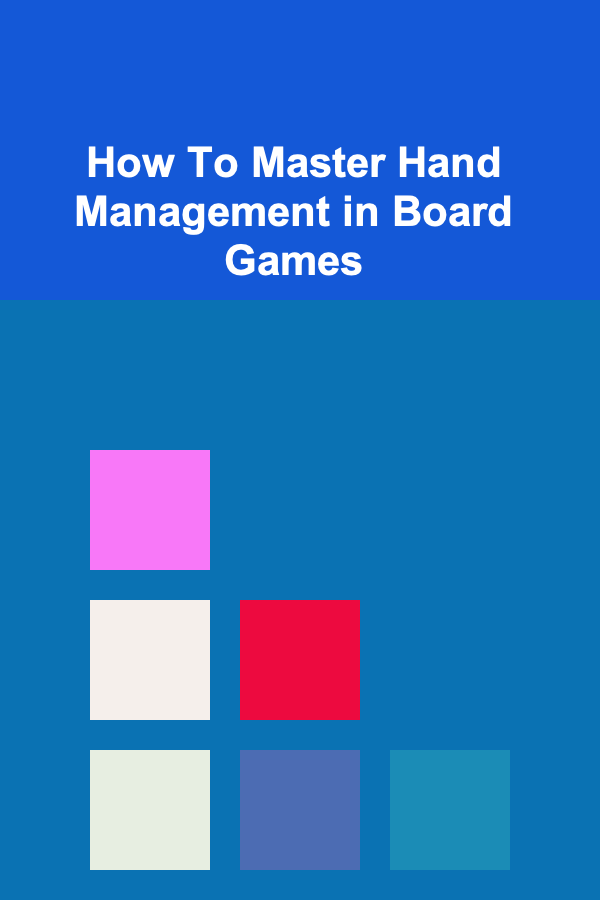
How To Master Hand Management in Board Games
ebook include PDF & Audio bundle (Micro Guide)
$12.99$5.99
Limited Time Offer! Order within the next:

Hand management is a crucial aspect of many strategic board games, where players are tasked with making optimal decisions based on limited resources. Whether you're playing a card game like Dominion , a deck-building game like Marvel Legendary , or a classic game like Bridge, hand management plays a pivotal role in determining your success. By effectively managing your hand, you can create synergies, prevent overextension, and outmaneuver opponents. Mastering hand management involves a mix of strategic planning, adaptability, and psychological insight into your opponents' behaviors.
In this article, we will explore the fundamentals of hand management in board games, break down strategies for improving your hand management skills, and analyze different types of board games where hand management is crucial. We'll also look at common mistakes players make and how to avoid them.
The Fundamentals of Hand Management
Hand management involves controlling the cards or resources you hold in your hand in a way that maximizes your chances of winning the game. It's about knowing when to hold onto cards for future use, when to play them, and how to balance the potential value of your hand against the risks posed by holding onto cards for too long.
There are several core principles that govern hand management:
1.1 Understanding the Value of Your Hand
In many card-based board games, each card has a value, whether it's a direct point value, a resource, or an action. Understanding how each card in your hand fits into your strategy is key to effective hand management. For example, in games like Dominion, cards might offer different types of currency (coins, actions, etc.), and knowing how to play your cards in the right order can make the difference between success and failure.
The value of your hand is often dynamic and can change throughout the game as the state of the game evolves. For example, early on, you may need cards that increase your resources, but later, cards that offer victory points may become more valuable.
1.2 Managing Resources
In most board games, cards aren't just about actions or points -- they're also about managing limited resources. In games like Race for the Galaxy or Star Realms, players must manage energy, trade, or other resources that are integral to gameplay. Hand management here requires balancing how much of these resources you have in your hand at any given time.
Knowing when to spend resources versus when to hold onto them for future turns is essential. If you overcommit to an expensive play early, you might find yourself with an empty hand later, leaving you vulnerable to your opponents. On the flip side, if you hold onto resources for too long, you might miss opportunities for game-changing plays.
1.3 Timing Your Plays
One of the most critical aspects of hand management is timing. Even if you have the perfect cards in your hand, playing them at the wrong time can still lead to poor outcomes. In some games, timing can be everything -- knowing when to hold back and when to strike can turn the tide in your favor.
In games like 7 Wonders, for instance, managing your hand effectively means knowing when to play certain cards that will synergize with others you have planned in the future, while not overcommitting early on when it's not yet beneficial.
1.4 Knowing When to Discard or Sacrifice Cards
Discarding cards or sacrificing potential plays is often as important as playing them. In games where your hand is limited, and discarding happens frequently, knowing which cards to keep and which to discard can give you a strategic advantage. This is especially true in games like Android: Netrunner, where you must carefully manage both your deck and hand, often making difficult choices about what to discard.
Strategic discarding can also be used as a bluff or to mislead opponents. Discarding a card that you would typically want to keep can cause your opponents to misjudge your position or underestimate your strength.
Strategies for Mastering Hand Management
Mastering hand management involves employing several key strategies that will give you an edge over your opponents. While there's no one-size-fits-all approach, understanding the different tactics you can use will help you fine-tune your playstyle.
2.1 Prioritize Card Synergies
Many games reward players for creating synergies between the cards in their hand. Synergy-based strategies often focus on creating combos, where playing one card enables another to become more powerful or beneficial. Mastering these synergies can give you a huge advantage in games where combinations of cards lead to powerful effects.
In games like Dominion, for instance, building a deck with strong synergy between cards is critical. If you've gathered cards that allow you to draw more cards or gain additional actions, you'll be able to maximize the value of each card and generate more powerful turns. Recognizing when cards complement each other can drastically improve your overall strategy.
2.2 Don't Be Afraid to Get Rid of Low-Value Cards
Not all cards are worth keeping, and many games offer opportunities to trade or discard low-value cards in exchange for something better. In games like Thunderstone Quest, where players can upgrade their cards, it's often a good idea to discard weaker cards that don't help you build your strategy.
Rather than holding onto every card in your hand, it's often better to discard cards that do not align with your overall strategy or provide minimal value. This allows you to refresh your hand and draw cards that offer better opportunities. Over time, this will help refine your hand and make it more effective.
2.3 Don't Overcommit Early On
One common mistake players make when managing their hand is overcommitting to a particular strategy too early. In many board games, especially those that evolve over time, committing heavily to one playstyle or strategy early can leave you vulnerable to opponents who adapt more flexibly.
Take Catan, for example. Early in the game, it's often wise not to overinvest in a single resource, as the dynamics of the board will change. Instead, you should focus on diversifying your resources and keeping your hand flexible, allowing you to adapt as the game progresses.
2.4 Use Bluffing to Your Advantage
In some games, your opponents are just as much a resource as your hand of cards. Bluffing and misdirection can be powerful tools in hand management. If your opponents are unsure of your intentions, they may make suboptimal plays, allowing you to take advantage of their uncertainty.
In games like Poker or The Resistance, where psychological warfare is a part of the game, playing cards in such a way that misleads or confuses your opponents can lead to significant benefits. For example, holding back a card in such a way that your opponents think you're holding a different one may cause them to misplay.
2.5 Evaluate the Risk vs. Reward
As you play, evaluate each card's potential against the risk it introduces. Playing a card might seem like a great idea initially, but it could leave you exposed to other players who have stronger cards or are in a better position. Conversely, you might hold onto a seemingly weak card, thinking it will be more beneficial later, only to find that it's not valuable in the context of your overall strategy.
The key to mastering hand management is knowing when the risk is worth the potential reward and when it's better to hold back and play a more conservative game.
2.6 Keep Track of Opponents' Hands
Knowing what your opponents have in hand is almost as important as knowing your own cards. In many games, there are subtle clues you can gather based on your opponents' actions, the cards they discard, or the cards they play. This information can help you make better decisions about when to play or discard certain cards.
In Bridge , for example, players pay attention to the suits and ranks of cards their opponents have played, which helps them deduce what might be left in their opponents' hands. Similarly, in games like Android: Netrunner, tracking your opponent's deck and understanding their card choices can guide you toward effective hand management.
Common Mistakes in Hand Management and How to Avoid Them
While mastering hand management is crucial, it's also important to recognize the common mistakes that players make. By learning from these errors, you can improve your strategy and avoid pitfalls.
3.1 Not Considering Future Turns
One of the most frequent mistakes players make is focusing too heavily on the present without considering how their current hand will impact future turns. Hand management requires foresight and planning -- it's not enough to simply play the most powerful card in your hand.
Think about how the cards you play now will set up your next few turns. Ask yourself: "How will this move affect my position in the long run?" For instance, you might sacrifice a turn of high-value plays to save up resources for a stronger combination in the next round.
3.2 Discarding Cards Too Quickly
It's easy to discard cards without thinking when your hand is crowded with low-value cards. However, you might be prematurely eliminating cards that could have future value. Take the time to analyze each card in your hand, considering both its immediate and long-term value.
3.3 Ignoring Card Draw Opportunities
Many players ignore the potential of drawing more cards, either due to lack of foresight or impatience. If you're able to manipulate your hand through card drawing, you can significantly improve your options. Games like Dominion and Race for the Galaxy reward players who focus on maximizing card draws and actions, allowing them to set up powerful combos.
Conclusion
Hand management is an essential skill for success in many strategy board games. By understanding the core principles, such as card synergies, resource management, timing, and adaptability, you can take control of your game and outmaneuver your opponents. Effective hand management is more than just playing the best card at the best time; it's about creating a long-term strategy that anticipates future challenges and maximizes your resources.
With practice and attention to detail, mastering hand management will become second nature, giving you an edge over players who focus solely on immediate gains. By applying these strategies and learning from your mistakes, you'll develop a deeper understanding of the game and significantly improve your chances of winning.

How to Create a Retirement Strategy with a Schwab Personal Choice Retirement Account
Read More
How to Organize Your Home Gym with Smart Storage Solutions
Read More
How to Use Labels to Keep Your Home Organized
Read More
What Tips Can Help You Maintain an Organized Kitchen?
Read More
How to Cook Healthy Grill and BBQ Recipes for Weight Loss
Read More
How to Use Blockchain for Digital Art: A Comprehensive Guide
Read MoreOther Products

How to Create a Retirement Strategy with a Schwab Personal Choice Retirement Account
Read More
How to Organize Your Home Gym with Smart Storage Solutions
Read More
How to Use Labels to Keep Your Home Organized
Read More
What Tips Can Help You Maintain an Organized Kitchen?
Read More
How to Cook Healthy Grill and BBQ Recipes for Weight Loss
Read More